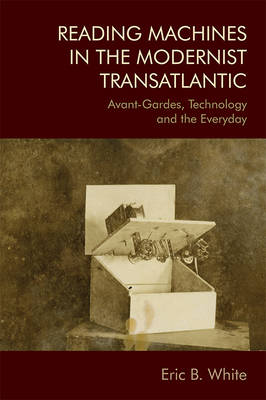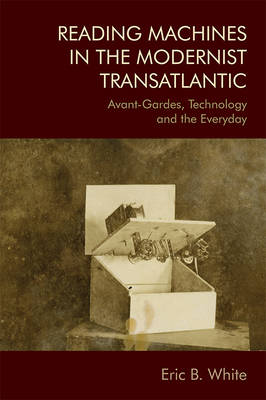
- Afhalen na 1 uur in een winkel met voorraad
- Gratis thuislevering in België vanaf € 30
- Ruim aanbod met 7 miljoen producten
- Afhalen na 1 uur in een winkel met voorraad
- Gratis thuislevering in België vanaf € 30
- Ruim aanbod met 7 miljoen producten
Reading Machines in the Modernist Transatlantic
Avant-Gardes, Technology and the Everyday
Eric B WhiteOmschrijving
A revisionist account of technology's role in the aesthetics, spaces and politics of transatlantic avant-gardes
Explores of a range of key avant-garde formations in the modernist transatlantic period, from the Italian futurists and English Vorticists to the Dada-surrealist and post-Harlem Renaissance African American experimentalistsExplores writers' and artists' inventions as well as their texts, and involves them directly in the messy transductions of technology in cultureDraws on previously unknown photos, manuscripts and other evidence that reveals the untold story of Bob and Rose Brown's 'reading machine' - a cross-disciplinary, meta-formational, and transnational project that proposed to transform the everyday act of reading
Reading Machines in the Modernist Transatlantic provides a new account of aesthetic and technological innovation, from the Machine Age to the Information Age. Drawing on a wealth of archival discoveries, it argues that modernist avant-gardes used technology not only as a means of analysing culture, but as a way of feeding back into it. As well as uncovering a new invention by Mina Loy, the untold story of Bob Brown's 'reading machine' and the radical technicities of African American experimentalists including Gwendolyn Bennett and Ralph Ellison, the book places avant-gardes at the centre of innovation across a variety of fields. From dazzle camouflage to microfilm, and from rail networks to broadcast systems, White explores how vanguardists harnessed socio-technics to provoke social change.
Specificaties
Betrokkenen
- Auteur(s):
- Uitgeverij:
Inhoud
- Aantal bladzijden:
- 288
- Taal:
- Engels
Eigenschappen
- Productcode (EAN):
- 9781474441490
- Verschijningsdatum:
- 22/07/2020
- Uitvoering:
- Hardcover
- Formaat:
- Genaaid
- Afmetingen:
- 156 mm x 234 mm
- Gewicht:
- 603 g

Alleen bij Standaard Boekhandel
Beoordelingen
We publiceren alleen reviews die voldoen aan de voorwaarden voor reviews. Bekijk onze voorwaarden voor reviews.











